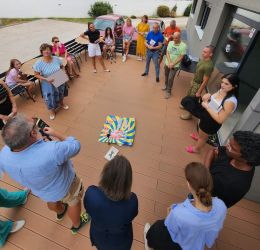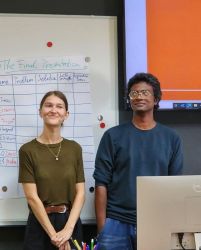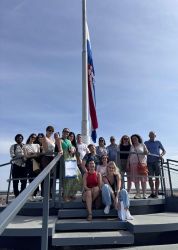An experience that changed my life as a teacher and leader
The journey to Vukovar in Croatia turned out to be one of those experiences that you carry with you for a lifetime. It was entirely unexpected, and when the opportunity presented itself, it sparked a sense of curiosity in me that I hadn't felt in a long time. As someone fairly new to teaching, I had my fair share of doubts about my abilities. Would I be up to the task? Would I be able to inspire and guide my students the way I always imagined? But despite those lingering uncertainties, I was determined to move forward with integrity and commitment. The encouragement and backing I received from my school and colleagues were invaluable. It gave me the confidence to take on the challenge and keep growing as a teacher.

Game-changer for me
When I was informed about and recommended for the 'Learn & Lead Teacher-Training Course, I knew it was a significant opportunity for me, not just professionally but personally. This course was vital for my development as an English teacher.
Being a teacher, l've come to realize, isn't just about delivering content from a book. It's a constantly evolving role that requires flexibility, creativity, and patience. You're responsible for guiding a group of students who each come with their own unique personalities, learning styles, and backgrounds. So, naturally, a one-size-fits-all approach just doesn't work. This is where the course became a game-changer for me—it was all about introducing the Learner-centred Approach (LCA) to teaching. It had always seemed easier to stick to traditional methods, follow the curriculum, and rely on a set structure. But while that might be simpler, I soon realized how limiting and ineffective it can be from a learner's perspective. It doesn't truly engage students or meet them where they are.
The training taught me the importance of tailoring lessons to the student's needs, making learning interactive, and ensuring that I am not just lecturing but actually facilitating their learning journey. The learner-centred approach encourages you to step away from the rigid, formulaic methods and focus on empowering your students, helping them become more active participants in their own learning process.
The first week
The first week of training was dedicated entirely to the principles and practice of the learner- centered approach, under the guidance of Miss Andrea, who led the sessions with such clarity and passion. She made it easy for us to grasp these concepts and showed us how powerful they could be when applied effectively. We delved into the seven key principles of LCA, which, to be honest, had a profound impact on the way I view teaching.
It made me realize that teaching is about so much more than just delivering information—it's about nurturing intellectual curiosity, encouraging critical thinking, and adapting to the different needs of each learner. It shifted my mindset from being a provider of knowledge to being a facilitator of learning.
Throughout that week, I was introduced to so many practical and engaging activities that I could bring into my classroom. These were activities designed to make learning more interactive, helping students to actively participate rather than passively receive information. In today's world, where information is readily available at the click of a button, it's even more important to make sure that the knowledge we share in the classroom is relevant and purposeful. The training made me see the value of focusing on what truly matters and teaching in a way that resonates with students, rather than just ticking off boxes in a curriculum. This experience wasn't just about learning new techniques; it was about reshaping how I approach teaching altogether. I finished the first week of the training course with a deeper understanding of how to engage my students more meaningfully and had an eagerness to apply what I had learned in my own classroom.
Second week - understanding the deeper layers
The Essentials of Communication in a Team
The following week took a deep, philosophical turn as we dove into the realms of self- reflection and self-awareness, led by the insightful master, Berislav. His course, The Essentials of Communication in a Team, revealed many dimensions of teamwork within an organization, showing us just how critical effective communication is for a group's success. I found this module particularly eye-opening, as it wasn't just about exchanging information—it was about understanding the deeper layers of interaction that create harmony or discord in a team.
Since most of us in the training came from different schools and organizations, we brought with us a wide range of experiences, approaches, and group dynamics. Yet, by the end of the course, we had all undergone significant growth in how we functioned as teams. We explored various methodologies that helped elevate our understanding of organizational development, but the one that stood out most to me was the 'Iceberg Model' by Virginia Satir. This model beautifully illustrated how much of what influences team behaviour lies below the surface-things like emotions, values, and unspoken expectations, which can either strengthen or hinder collaboration if not addressed. By uncovering these hidden factors, we were able to see how crucial it is to foster open, honest communication to build trust and alignment within a team.
The Essentials of New Leadership
This theme of effective communication seamlessly tied into the next course, The Essentials of New Leadership, which was equally transformative. It focused on the leadership qualities needed in today's evolving work environments, especially for those of us striving to guide others. Leadership, as we learned, isn't just about holding a position of authority; it's about being self- aware, adaptable, and capable of inspiring others through example. The course empowered each of us to look within, to identify and strengthen the qualities that make for a compassionate, yet decisive leader.Through both of these courses, I gained a profound understanding of the relationship between communication and leadership. To lead effectively, you must first communicate effectively-this means not only articulating your vision but also listening deeply, understanding the unspoken elements within your team, and fostering an environment where everyone feels heard and valued. I walked away with a renewed sense of purpose, excited to apply these lessons not only in my teaching career but in any leadership role I might find myself in going forward.

Final evaluation
In conclusion, this entire course experience has been nothing short of transformative, both personally and professionally. From the introduction of learner-centered teaching methods to the deep dives into communication, teamwork, and leadership, every aspect of the training has enriched my understanding of what it means to be an effective teacher and leader.
The journey not only enhanced my teaching skills but also reshaped the way I approach collaboration and leadership, empowering me to become more thoughtful, adaptable, and student-focused in my role. I am incredibly grateful to my school for providing me with this wonderful opportunity. Their support and belief in my potential were key motivators that pushed me to embrace every aspect of this learning experience with an open mind and full dedication. The skills and insights I have gained from this course are invaluable, and I am eager to bring them back to my classroom, enriching the learning experiences of my students and contributing more meaningfully to my colleagues and community.
This opportunity has not only helped me grow as a professional but has also deepened my commitment to education, and for that, I extend my heartfelt thanks.

Financované Európskou úniou. Vyjadrené názory a postoje sú názormi a vyhláseniami autora(-ov) a nemusia nevyhnutne odrážať názory a stanoviská Európskej únie alebo SAAIC. Európska únia ani SAAIC za ne nepreberajú žiadnu zodpovednosť.
Ansar Thayyib
Jazyková škola VAGeS
Podobné články

Rozdiely medzi jazykovým koučingom a výučbou

Ako bolo na workshope - učíme sa učiť












